Job is now in his third round of facing the critiques of his friends. He has already heard two rounds of the pious but false interpretations from his friends, Eliphaz, Bildad and Zophar. Eliphaz made the charge in Chapter 22 that Job’s suffering was the result of his sins. He appeals to Job to consider the sins that accompany those who are wealthy. He sets forth the conditions for fellowship with God, and he is not far off, but he presumes that Job’s problem is that his fellowship with God has been broken through his wrongdoing.
Job now responds to Eliphaz’s charges in Chapter 23. Job lets Eliphaz know that his counsel is insufficient and an oversimplification. Understanding the working of God and sensing God’s presence is not always easy. He is learning the hard lesson of trust. He is learning to be patient and wait for God to come through. He expresses his longing for God. He wants to hold on to Him, but he confesses that he cannot find him.
Job 23:3 3 “Oh that I knew where I might find Him, That I might come to His seat!”
This is a reminder that we must not give ‘pat’ answers when people are going through hard times. We should encourage trust, but we should not presume to have all the answers.
Job again anticipates the gospel. He knows he has need for a mediator to reason with God on his behalf.
Job 23:7 7 “There the upright would reason with Him; and I would be delivered forever from my Judge.”
Although Job cannot discern God’s presence and working, he affirms that God is in control of what he is going through, and that God is doing something to refine him.
Job 23:10 10 “But He knows the way I take; When He has tried me, I shall come forth as gold.”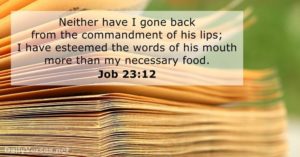
Job still knows that God’s commandment is true, and His Word is to be desired.
Job 23:12 12 “I have not departed from the command of His lips; I have treasured the words of His mouth more than my necessary food.”
Do we desire His Word above our necessary food?
Job expresses confidence in the midst of his confusion. He knows he is baffled to be able to fight better.
Job 23:14 14 “For He performs what is appointed for me, and many such decrees are with Him.”
God’s workings are not accidents but are purposed for His good reasons.
Job admits that he is experiencing darkness, the dark night of the soul, a form of spiritual depression.
Job 23:16-17 16 “It is God who has made my heart faint, and the Almighty who has dismayed me, 17 But I am not silenced by the darkness, nor deep gloom which covers me.”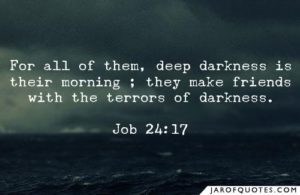
‘Why is God not intervening?’ Job asks. In Chapter 24 Job describes the evil and darkness in this ‘Genesis 3’ world. Why does God seem to be a billion miles away? Job is longing for all that is to be found in Jesus Christ. He is crying out for our Immanuel, God with us, the Light of the World, the Savior of the world, the One who makes all things new.
Then in Chapter 25 we read Bildad’s short speech in round 3. Job’s accusers are running out of steam. Bildad’s brief speech is the last one from the three. Zophar will drop out of the third round. This shows that Job’s three friends are not prepared to go beyond their presuppositions, their imperfect knowledge.
Job was thrown into the fiery furnace of his trial with the testimony that he was in a right relationship with God through faith in His promise. He is knowing the fellowship of the sufferings of Christ.
Abel believed God and was killed by his jealous brother. Was he killed because he did something wrong? No, he did what was right. Joseph was imprisoned. Was he imprisoned because he did something wrong or right? Daniel’s friends were thrown into the furnace. Was it because they did something wrong or right? Daniel was thrown into the lion’s den, not because he did something wrong, but something right.
Bildad’s speech is the shortest in the Book. He focuses on power (25:1-3) and justice (25:4-6).
We cannot argue with Bildad’s statements.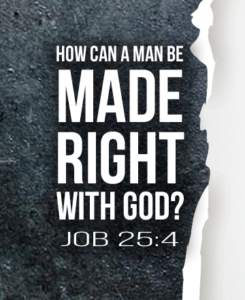
Bildad asks the ancient question that should cause us to long for the perfect redeeming work of Jesus Christ.
Job 25:4 4 “How then can a man be just (made right) with God? Or how can he be clean who is born of woman?
The gospel of Jesus Christ answers this question.
Job replies that God’s majesty is unsearchable.
He speaks of the wonders of creation, including the planet’s position in space:
Job 26:7 7 “He stretches out the north over empty space and hangs the earth on nothing.
In Chapter 27 Job seems to pause, anticipating that Zophar would have something to say after Bildad. But Job is silencing his three friends (Job 32:1).
Now Job will speak for five chapters. Chapter 27-31 contain two great speeches. Each section begins with the words, “And Job took up his discourse, and said.” (Job 27:1; Job 29:1).
Job speaks the language of perplexity and pain. He admits that God has vexed his soul and that he does not know the reasons for his suffering. Yet he holds on to his faith in God with integrity. Notice that he does this while freely expressing his questions and the painful condition of his soul.
TODAY’S READING FROM THE NEW TESTAMENT – 2 CORINTHIANS 1:12-2:11
In Paul’s letter to the Corinthians, Paul finds himself in the awkward position of having to defend himself to his own children in the Lord. Many of the Corinthian believers came to faith in Christ under his previous ministry. Now they had been deceived by false teachers and ‘super apostles’ who came in twisting the Scriptures, deceiving them from the simplicity that is in Christ. They claimed that Paul was insincere, that he was all talk, and that he did not have a ministry of power. They claimed that Paul was strong in his letter writing, but weak when he appeared in person. They claimed that he was sub-par because he did not charge money for his teaching, inferring that his teaching was of less quality. They also accused him of vacillating in his commitments, for he said he would come and visit Corinth twice on his latest missionary journey, but was delayed, and only visited once on that trip.
His initial plan was that he was going to visit Macedonia first, then Corinth on his way back from Ephesus to Jerusalem (1 Cor 16:5).
However, before visiting Corinth, on his return from Ephesus, he sent Timothy to visit (Acts 19:22; 1 Cor 16:10-11). Timothy brought back a report to Paul that the church at Corinth was once again in turmoil, and that many of the Corinthian believers were turning against him. Paul decided that he would first go to Corinth to resolve the issues and then go to Macedonia (2 Cor 1:15). He resolved that he would visit the Corinthians again on his return trip from Macedonia, so they would be able to help him in his fund-raising for the suffering church in Jerusalem, before he traveled on with his collection to Judea.
Paul’s critics and enemies put a spin on Paul’s change of travel plans, accusing him of not being forthright, not communicating properly, and vacillating when making decisions. These charges were not true. For the sake of the gospel, Paul had to defend himself. He would much rather talk about Christ, but the situation forced him to tell his personal story and reveal his motives.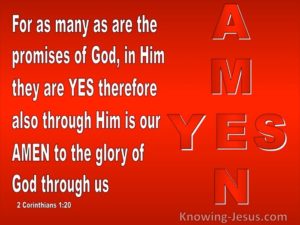
Paul explains that his yes is yes, and his no is no. Yet we must make allowances for God to overrule our plans with His sovereign interventions.
Some of Paul’s critics compared him unfavorably to the false teachers, the ‘super-apostles’, who preached and lived an extravagant prosperity gospel. They claimed that Paul could not be a bonafide apostle because he suffered too many hardships and because he chose not to take financial support from the Corinthian believers.
Paul wants to stand confidently before God in the final day (the judgment of believer’s works). He wants the Corinthians to be able to do that also. His confidence is not in His own performance but in Christ’s. He knows that Christ is His righteousness and that all the promises of God are Yes and Amen in Him.
Paul is confident in his calling. He is confident that he has the authority to speak into the lives of the Corinthian believers. His confidence is in the anointing of the Spirit on his life and ministry.
We can discern Paul’s heart as he writes to correct the church in Chapter 2. In his previous letter (1 Corinthians) he reprimanded the church for failing to discipline the man who was involved in a sexual relationship with his stepmother. Because the man was unrepentant, they were to put him out of the membership, lest he presume that he was in fellowship with Christ while he was living in rebellion to the law of Christ. It appears that in the interim, the man repented, and the church now was failing to forgive the man and restore him to fellowship. Satan was taking advantage of their unforgiveness and their withholding loving fellowship from him. For this Paul had to offer correction once again:
2 Corinthians 2:6-11 6 Sufficient for such a one is this punishment, which was inflicted by the majority, 7 so that on the contrary you should rather forgive and comfort him, otherwise such a one might be overwhelmed by excessive sorrow. 8 Wherefore I urge you to reaffirm your love for him. 9 For to this end also I wrote, so that I might put you to the test, whether you are obedient in all things. 10 But one whom you forgive anything, I forgive also; for indeed what I have forgiven, if I have forgiven anything, I did it for your sakes in the presence of Christ, 11 so that no advantage would be taken of us by Satan, for we are not ignorant of his schemes.
Are we guilty of withholding love and forgiveness towards those who have demonstrated humble repentance?
TODAY’S READING FROM THE BOOK OF PSALMS- PSALM 41:1-13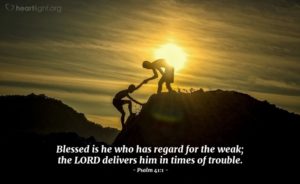
This Psalm describes the blessedness of those who mirror God’s regard for the weak. He affirms the graciousness experienced by the child of God. He or she experiences God’s deliverance in times of trouble. They experience God’s healing and sustaining power.
In contrast to the Psalmist’s description of God’s gracious treatment towards him, he laments that his enemies wish him dead. They slander him. He finds himself a victim of their evil plots and cursing. Even his closest friend betrayed him. This brings to mind not just Ahithophel’s betrayal of David, but Judas’ betrayal of Christ.
Psalm 41:9 9 Even my close friend in whom I trusted, who ate my bread, has lifted up his heel against me.
Jesus would quote this verse referring to Judas betraying him (John 13:18-19).
John 13:18-19 18 “I do not speak of all of you. I know the ones I have chosen; but it is that the Scripture may be fulfilled, ‘HE WHO EATS MY BREAD HAS LIFTED UP HIS HEEL AGAINST ME.’ 19 “From now on I am telling you before it comes to pass, so that when it does occur, you may believe that I am He.
Like Job, David, the Psalmist, puts his trust in God’s mercy and holds that trust with integrity.
Psalm 41:12 12 As for me, You uphold me in my integrity, And You set me in Your presence forever.
TODAY’S READING FROM THE BOOK OF PROVERBS- PROVERBS 22:5-6
Proverbs 22:5-6 5 Thorns and snares are in the way of the perverse; He who guards himself will be far from them. 6 Train up a child in the way he should go, even when he is old, he will not depart from it.
PRAY FOR THE NATIONS – MAURITANIA
Mauritania
Islamic Republic of Mauritania
Africa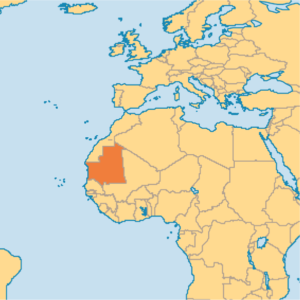
Geography
Area: 1,030,700 sq. km
Entirely desert apart from the north bank of the Senegal River on its southern border.
Population: 3,365,675 Annual Growth: 2.43%
Capital: Nouakchott
Urbanites: 41.4%
HDI Rank: 154 of 182 (UN Human Development Reports 2009)
Peoples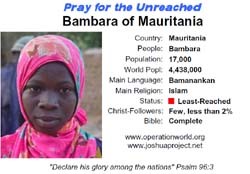
Official language: Arabic; the Hassaniya dialect is used as the vernacular for two-thirds of the population. French is the language of government and commerce
Languages: 8
Religion
Largest Religion: Muslim
|
Religion |
|
Pop % |
Ann Gr |
|
8,414 |
0.25 |
2.4 |
|
|
2,081 |
0.1 |
6.7 |
|
|
Muslim |
3,357,261 |
99.75 |
|
Challenges for Prayer
Mauritania is one of the world’s neediest countries. One-third of children face chronic malnourishment, and many families struggle to afford basic necessities. Widespread divorce also causes social difficulties. Desertification threatens the remaining arable land, which amounts to perhaps only 1% of the total land area. The discovery of oil and new mineral reserves could either bring wealth to the country or increase corruption and the divide between rich and poor. Pray for political stability and wisdom for the government to enable revenues from Mauritania’s natural resources to benefit the poor.
Political issues are historical and highly charged, although the elected government is widely seen as progressing forward. Despite slavery being illegal, allegations of slavery persist, and thousands are thought to live in such circumstances. Interethnic and intertribal tensions remain from past violence over the White Moor-dominated government seizing Black African lands and livestock. Pray for justice for all who have been oppressed.
PRAYER: Lord, we are aware that to know You in the power of resurrection, we are also to know You in the fellowship of Your sufferings. You prepare us with Your Word and protect us by Your preserving power. We wait patiently for You, confident that You will deliver us in due time. You are worthy of everlasting praise and undying trust. Help us to testify rightly of Your glorious work of salvation. In Jesus’ Name. Amen.
